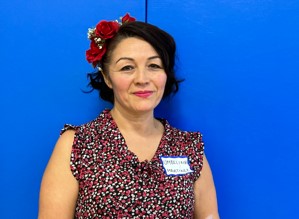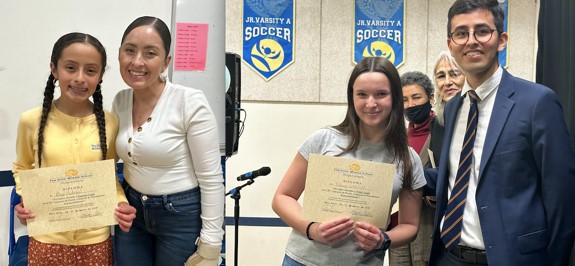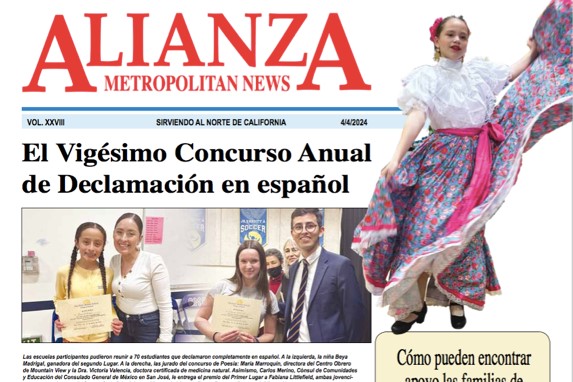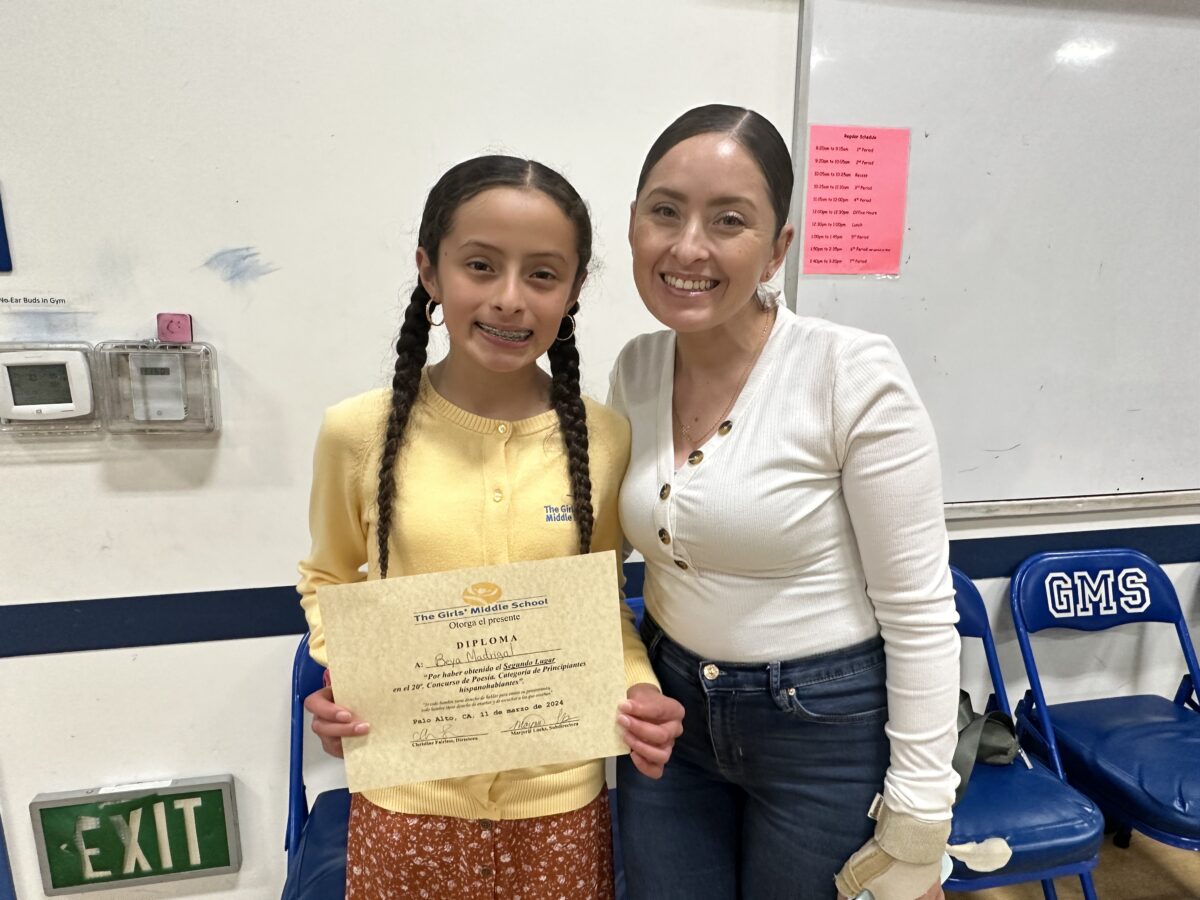The 20th Annual Declamation Competition in Spanish
By Veronica Meza, La Movida Magazine
PALO ALTO, CA. The Girls’ Middle School (GMS), a progressive secondary school located in Palo Alto, California, celebrated the Twentieth Spanish Poetry Contest that brought together seven elementary, middle, and high schools from the public and private sectors.

To celebrate the privilege of learning and speaking Spanish in California, The Girls’ Middle School (GMS) annually holds a declamation contest completely in Spanish, led by teacher Verónica Meza. Photo by Rossana Drumond, Alianza News
Over the years, the educational system has focused on prioritizing the teaching of STEM, where science, technology, engineering, and mathematics prevail as fundamental tools to create a competitive student who can meet the demands of the educational, social, and economic system, according to this country.
However, our society needs to create an integral human being in direct contact with emotions and learn empathy, solidarity, compassion, and respect for cultural diversity. Students must understand the values in the family bond, but it is necessary to reinforce them at school through classes such as art, humanities, and language learning. The goal is to create a student who can solve problems, take risks, collaborate as a team, and work creatively.

The presence of the poet Umbelina Martínez with her poem, “Maria, the brave”, graced the event with a poem that described the problem of domestic violence, and how one can escape psychological, verbal and physical abuse with courage and dignity . Photo by Rossana Drumond, Alianza News.
For centuries, poetry has been an indispensable artistic tool that allows different poets worldwide to eloquently express the social, political, economic, and emotional situations human beings live over time. Therefore, theater, music, dance, plastic arts, and poetry express an emotion artistically.
To celebrate the privilege of learning and speaking Spanish in California, The Girls’ Middle School (GMS) holds an annual recitation contest entirely in Spanish. The 20th Annual Spanish Contest brought together the following school participants: Escondido Elementary School, Avoca Elementary School (from Glenview, Illinois), French American School of Silicon Valley, Menlo Middle School, Eastside Preparatory Academy, Dublin High School, and the host school, GMS. The recitation contest was divided into four categories: Basic Spanish and Advanced Spanish, and it was focused on students who take Spanish as a second language. The categories are Spanish for beginners and Spanish for experts for native language students.

The participating schools were able to bring together 70 students who recited completely in Spanish. On the left, the girl Beya Madrigal, winner of second place. On the right, the judges of the Poetry contest: María Marroquín, director of the Mountain View Workers’ Center and Dr. Victoria Valencia, certified doctor of natural medicine. Likewise, Carlos Merino, Consul of Communities and Education of the Consulate General of Mexico in San José, presents the First Place award to Fabiana Littlefield, both young women are winners in the Spanish-Speaking Beginners Category. Photos: Rossana Drumond, Alianza News.
With poems like “What is left for the young?” by the Uruguayan poet Mario Benedetti, the GMS 8th-grade student Mihika Bansal received 1st. Place in the advanced category as a second language. They were giving voice to a poem full of strength and social criticism of the future of young people. Julia Hug, in turn, recited the verse “Ode to the Cat” by Chilean poet Pablo Neruda. The student masterfully described the complex personality of a cat and received 1st place in the primary category. Fabiana Littlefield also recited “Don’t Give Up” by Mario Benedetti, receiving first place in the fluent beginner’s category. In the expert category, students Ara López-Breton, with the poem “Foolish Men, You Accusate,” and Daphne Martínez, with the poem “Love Begins with Disquiet” by the Mexican poet Sor Juana Inés de la Cruz, received first place.
The declamation contest united students’ voices through the Spanish language. At the same time, the extraordinary interpretation could be appreciated entirely in Spanish by students of different cultural heritage, such as Americans, Japanese, Chinese, Indians, Europeans, and Hispanics. The Chilean poem feast, Pablo Neruda with his magnificent odes, and Gabriela Mistral with her feminist poems. Federico García Lorca, a classical Spanish poet, with his poems dedicated to the guitar or dance. Antonio Machado, a Spanish poet, with his poem, “Walker there is no path,” performed with a beautiful voice by student Bryan Herrera from Eastside Preparatory Academy. Poet Alfonsina Storni with her poem, “The Journey,” recited by student Chloe Opden Kamp. Or the poems of Octavio Paz, a Mexican poet, “The Street,” recited by Emma Dwight, or “Silencio,” recited by student Anwen Lui, among others.
The participating schools brought together 70 students who recited entirely in Spanish. The Hispanic personalities, members of the jury, and in charge of evaluating the incredible talent of all the students were María Marroquín, director of the Mountain View Workers’ Center, Rossana Drummond, publisher for Alianza Metropolitan News, Consul Carlos Merino, Consul of Communities and Education from the Consulate General of Mexico in San José, California, Luis Vizcardo, program director of the company Skylawn and bilingual consultant for Environmental Innovations, Inc., and Dr. Victoria Valencia, certified doctor of natural medicine. The presence of the poet Umbelina Martínez, with her poem, “Maria, the Brave,” graced the event with a poem that described the problem of domestic violence and how one can escape psychological, verbal, and physical abuse with courage and dignity.
The students, without a doubt, were delighted when they presented each of their poems in Spanish. It is gratifying to appreciate that despite this country’s complex political, social, and economic situation, the spirit of the students, the Spanish teachers, and the attending parents could identify with each of the words and emotions a well-recited poem could generate.
If you would like to learn how to participate as a K-12 school or individually in the Declamation Contest next year, you can email Veronica Meza at vmeza@girlsms.org.

Furthermore, we say goodbye with the strength of the voice through poetry, with the poem “What it is Left to Young People” by Mario Benedetti, Uruguayan novelist, journalist, and poet (1920-2009).
“What is left for young people?
Place yourself in a story that is yours.
Don’t become old prematurely.
What is left for young people to prove?
In this world of routine and ruin?
Cocaine? Beer? Brave bars?
They have to breathe, open their eyes
Discover the roots of horror
Invent peace, even if it is with punches
Understanding nature
And with the rain and the lightning
And with the feeling and with death
That crazy thing about tying and untying
What is left for young people to prove?
In this world of consumption and smoke?
Vertigo? Assaults? Nightclubs?
They also have to argue with God
Whether it exists or not
Extend helping hands, open doors
Between your own heart and that of others.
Above all, they have to make the future
Despite the ruins of the past
And the wise scoundrels of the present.”

